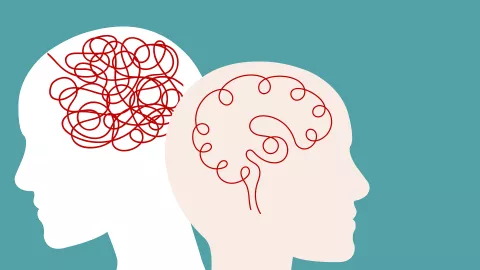Support and assistance for individuals with mental illnesses
Understanding Mental Illness
Mental illness encompasses a wide range of conditions that affect a person’s thinking, feeling, behavior, and mood. These conditions can significantly impact an individual’s daily functioning and quality of life. It is crucial to understand that mental illnesses are medical conditions that can be diagnosed and treated, just like physical health conditions.
Individuals with mental illness may experience a variety of symptoms that can vary in severity and duration. Some common mental health disorders include depression, anxiety disorders, bipolar disorder, schizophrenia, and eating disorders. It is important to recognize that mental illness is not a sign of weakness or character flaw, but rather a complex interplay of biological, psychological, and environmental factors.
Types of Mental Health Disorders
Mental health disorders encompass a wide array of conditions that can affect an individual’s thoughts, emotions, and behaviors. Among the most common types of mental health disorders are anxiety disorders, characterized by excessive worry, fear, or nervousness that can interfere with daily life. Depression, another prevalent disorder, involves persistent feelings of sadness, hopelessness, and disinterest in activities once enjoyed. Bipolar disorder is marked by extreme mood swings, shifting between periods of elevated energy and activity (mania) to episodes of deep sadness and lethargy (depression).
Schizophrenia is a severe mental health disorder characterized by hallucinations, delusions, and disordered thinking, often leading to challenges in perception of reality. Eating disorders like anorexia nervosa and bulimia nervosa involve distorted body image and unhealthy behaviors around food consumption. Post-traumatic stress disorder (PTSD) can develop after experiencing a traumatic event, leading to symptoms such as flashbacks, nightmares, and severe anxiety. Obsessive-compulsive disorder (OCD) involves persistent thoughts (obsessions) and repetitive behaviors (compulsions) that can interfere with daily functioning.
Signs and Symptoms of Mental Illness
Mental illnesses can manifest in various ways, often presenting a complex array of signs and symptoms. Individuals experiencing a mental health disorder may exhibit changes in their behavior, emotions, and thinking patterns. Some common signs include persistent feelings of sadness or hopelessness, sudden mood swings, excessive fears or worries, and difficulty concentrating or making decisions. Physical symptoms such as unexplained aches and pains, changes in appetite or sleep patterns, and fatigue without a clear cause can also indicate an underlying mental health issue.
Moreover, observable behavioral changes such as withdrawal from social activities, decreased performance at work or school, substance abuse, and sudden anger or hostility towards others may be indicative of a mental health concern. Additionally, cognitive symptoms like confused thinking, disconnected speech, persistent negative thoughts, and difficulty perceiving reality can be alarming indicators of a potential mental illness. Recognizing these signs and symptoms early on is crucial in seeking timely intervention and support for individuals grappling with mental health challenges.
Seeking Professional Help
When facing mental health challenges, seeking professional help is a crucial step towards managing symptoms and improving overall well-being. A mental health professional, such as a therapist, psychologist, or psychiatrist, can provide the necessary support and guidance to navigate through difficult feelings and thoughts. Through therapy sessions, individuals can explore their emotions, identify triggers, and develop coping strategies to address their mental health concerns effectively. Professional help offers a safe and confidential space for individuals to express themselves openly and work towards healing and growth.
The decision to seek professional help demonstrates strength and self-awareness in acknowledging the need for assistance in addressing mental health issues. With the guidance of a trained professional, individuals can gain valuable insights into their condition and learn techniques to manage symptoms more effectively. Through therapy, individuals can acquire coping skills, improve self-esteem, and build resilience to navigate life’s challenges with greater ease and confidence. The support and expertise of a mental health professional play a significant role in promoting mental wellness and facilitating the journey towards recovery.
Therapy Options for Mental Health
Therapy is a vital component in the treatment of mental health disorders, offering individuals a safe space to explore their thoughts, feelings, and behaviors with a trained professional. One commonly utilized form of therapy is cognitive-behavioral therapy (CBT), which focuses on identifying and changing negative thought patterns and behaviors that contribute to mental health issues. Through CBT, individuals learn skills to better manage their emotions and improve their overall well-being.
Another effective therapy option is dialectical behavior therapy (DBT), designed to help individuals regulate their emotions, improve relationships, and develop mindfulness skills. DBT combines elements of cognitive-behavioral techniques with ideas from Eastern mindfulness practices, providing a comprehensive approach to addressing complex mental health challenges. By incorporating strategies such as distress tolerance and emotion regulation, DBT equips individuals with the tools necessary to cope with difficult situations and enhance their quality of life.
Medication Management
Medication management is a crucial aspect of treating various mental health disorders. Psychiatric medications are prescribed by healthcare professionals to help regulate brain chemistry and alleviate symptoms such as anxiety, depression, or bipolar disorder. It is important for individuals to take medications as directed, adhere to the recommended dosage, and communicate any side effects or concerns with their healthcare provider promptly.
Individual response to psychiatric medications can vary, and it may take some time to find the most effective medication and dosage. Monitoring the effects of medication closely with a healthcare provider is essential to ensure optimal treatment outcomes. Additionally, it is important for individuals to be aware of any potential interactions between psychiatric medications and other medications or substances they may be using. Seeking regular follow-up appointments with healthcare providers to assess the medication’s efficacy and make any necessary adjustments is vital in the management of mental health disorders.
Importance of Self-Care
Self-care is a fundamental aspect of maintaining good mental health. It involves taking deliberate actions to nurture one’s well-being, both physically and mentally. Engaging in self-care practices can help individuals manage stress, improve their mood, and enhance overall quality of life. Self-care activities may vary from person to person but commonly include hobbies, exercise, healthy eating, relaxation techniques, and setting boundaries to protect personal time and energy.
Neglecting self-care can lead to burnout, increased anxiety, and even exacerbate mental health conditions. It is crucial for individuals to prioritize self-care as a non-negotiable part of their daily routines. By making self-care a priority, individuals can better cope with life’s challenges, maintain emotional balance, and prevent the onset of mental health issues. Remember, self-care is not selfish, but rather a vital practice that allows individuals to show up as their best selves in all aspects of life.
Building a Support System
When facing challenges related to mental health, having a strong support system in place can provide crucial assistance and encouragement. Family members and friends who offer understanding and empathy can play a significant role in one’s journey towards mental wellness. Moreover, seeking support from mental health professionals, such as therapists or counselors, can provide valuable guidance and therapeutic interventions tailored to individual needs. These professionals can offer insights, coping strategies, and a safe space for open dialogue on managing mental health concerns.
In addition to personal connections and professional support, peer support groups can be instrumental in building a robust network of individuals who share similar experiences and can offer mutual understanding and encouragement. Engaging with such groups can provide a sense of belonging and validation, as well as the opportunity to learn from others’ coping mechanisms and resilience strategies. By fostering connections with a diverse range of supportive individuals, individuals navigating mental health challenges can cultivate a strong foundation for their well-being and empowerment.
Community Resources for Mental Health
Community resources play a crucial role in providing support and assistance to individuals navigating mental health challenges. These resources encompass a wide range of services such as counseling centers, support groups, crisis hotlines, and community mental health clinics. Access to these resources can help individuals connect with trained professionals and peers who can offer guidance, understanding, and encouragement during difficult times.
Moreover, community organizations and non-profit agencies often collaborate to offer workshops, educational programs, and awareness campaigns to promote mental health literacy and destigmatize seeking help. By engaging with these community resources, individuals can not only receive practical assistance but also find a sense of belonging and solidarity in knowing that they are not alone in their journey towards mental wellness.
Workplace Accommodations for Mental Health
Creating a supportive work environment that accommodates employees’ mental health needs is essential for both the individuals’ well-being and the overall productivity of the organization. Employers can implement various accommodations to foster a mentally healthy workplace, such as flexible work hours, remote work options, and access to mental health resources. By offering these accommodations, employers demonstrate their commitment to prioritizing their employees’ mental wellness and creating a more inclusive and understanding workplace culture.
In addition to flexible work arrangements, employers can also provide mental health training for managers and colleagues to increase awareness and understanding of mental health issues. This training can help reduce stigma, improve communication, and enhance support for employees experiencing mental health challenges. By promoting a culture of empathy and support, workplaces can cultivate a more positive environment where employees feel comfortable seeking help and taking care of their mental health needs.
Coping Strategies for Daily Life
Coping strategies are essential tools for individuals managing mental health challenges on a day-to-day basis. One effective strategy is mindfulness, which involves staying present in the moment without judgment. Engaging in mindfulness practices such as meditation, deep breathing exercises, and grounding techniques can help reduce stress and promote emotional well-being. Additionally, maintaining a routine can provide stability and predictability, contributing to a sense of control over one’s life.
Another coping strategy is practicing self-compassion and self-care. It is crucial for individuals to treat themselves with kindness and understanding, especially during difficult times. Setting boundaries, prioritizing rest and relaxation, and engaging in activities that bring joy and fulfillment are all ways to nurture one’s mental and emotional health. Developing a healthy lifestyle that includes regular exercise, balanced nutrition, and sufficient sleep can also play a significant role in managing stress and improving overall well-being.
Advocacy for Mental Health Rights
Advocacy for mental health rights plays a pivotal role in ensuring access to quality care and support for individuals grappling with mental health disorders. It involves lobbying for policies that foster equality, destigmatize mental illnesses, and promote effective treatment options. Advocates strive to establish frameworks that safeguard the rights of those with mental health conditions, advocating for fair treatment in healthcare settings, workplace environments, and society at large.
Furthermore, advocacy efforts aim to raise awareness about the prevalence and impact of mental health issues, pushing for legislative changes and resource allocations that address the needs of those affected. By amplifying the voices of individuals with lived experiences, advocacy for mental health rights seeks to create a more inclusive and compassionate society where mental health is prioritized and respected.
Stigma Reduction Efforts
Stigma surrounding mental health continues to be a significant barrier for individuals seeking help and support. Efforts to reduce this stigma have gained momentum in recent years, with organizations and advocates working tirelessly to challenge misconceptions and promote understanding. By highlighting the common humanity shared by all individuals, regardless of mental health status, these initiatives strive to foster compassion and empathy within communities.
Through education and awareness campaigns, stigma reduction efforts aim to debunk myths and stereotypes that contribute to discrimination against those with mental health disorders. By emphasizing the importance of destigmatizing conversations and promoting acceptance, these initiatives empower individuals to speak openly about their struggles without fear of judgment or marginalization. It is crucial for society as a whole to recognize the harms of stigmatizing attitudes and actively work towards creating a more inclusive and supportive environment for individuals with mental health challenges.







